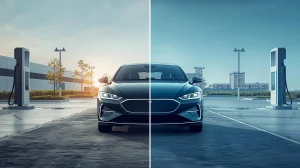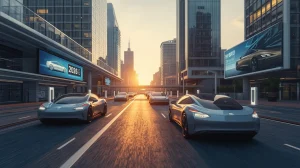Automotive Industry: Innovative the Future of Electric Vehicles in 2024

Automotive Industry: Innovative the Future of Electric Vehicles in 2024-In recent years, the automotive industry has witnessed a profound transformation, with electric vehicles (EVs) at the forefront of this revolution. Once considered a niche market, EVs are now driving mainstream adoption, reshaping how we think about transportation and sustainability. This shift is not just a trend but a necessary evolution to combat climate change and reduce our carbon footprint.
The Rise of Electric Vehicles
Electric vehicles, powered by electric motors and batteries rather than internal combustion engines, are gaining momentum globally. Advances in technology, coupled with increasing environmental awareness, have made EVs more accessible and appealing to consumers. Companies like Tesla, Nissan, and Chevrolet have led the charge, showcasing the performance, efficiency, and innovation that EVs bring to the table.
Technological Advancements
One of the most significant factors driving the growth of EVs is the rapid advancement in technology. Battery technology, in particular, has seen remarkable progress. Lithium-ion batteries, which power most EVs today, have become more efficient, lighter, and cheaper. This has extended the range of EVs, alleviating one of the major concerns of potential buyers: range anxiety. Additionally, the development of solid-state batteries promises even greater efficiency and safety, potentially revolutionizing the automotive industry further (Read More : Hybrid Technology Developments: Paving the Way to Greener Mobility).
Environmental Impact

The push for EVs is largely fueled by the urgent need to reduce greenhouse gas emissions. Transportation is one of the largest contributors to global carbon emissions, and transitioning to electric vehicles is a critical step toward a sustainable future. EVs produce zero tailpipe emissions, significantly lowering the pollution levels in our cities. Moreover, as the grid becomes greener with more renewable energy sources, the environmental benefits of EVs will continue to increase.
Economic and Policy Support
Governments around the world are increasingly supporting the shift to electric mobility through various incentives and regulations. Tax credits, rebates, and grants are making EVs more affordable for consumers, while stricter emissions standards are pushing automakers to innovate. Countries like Norway, China, and the Netherlands are leading the way with aggressive policies to phase out internal combustion engine vehicles, setting ambitious targets for EV adoption.
Challenges and Opportunities
Despite the positive trends, the transition to electric vehicles is not without challenges. One of the main hurdles is the charging infrastructure. While public charging networks are expanding rapidly, the availability and convenience of charging stations remain critical to widespread adoption. Innovations in fast-charging technology and home charging solutions are crucial to address these concerns.
Additionally, the automotive industry must overcome the issue of battery disposal and recycling. As the number of EVs on the road increases, so does the need for sustainable battery recycling programs to prevent environmental harm. Companies and governments are investing in research to develop efficient recycling technologies and reduce the environmental impact of used batteries (Read More : The Impact of Supply Chain Crisis on Global Industries).
The Role of Innovation
Innovation continues to be a cornerstone of the automotive industry’s shift to electric vehicles. Startups and established automakers alike are investing heavily in research and development to enhance vehicle performance, range, and affordability. Autonomous driving technology, which is closely linked to EV development, is also set to revolutionize the automotive industry. Self-driving EVs promise to enhance safety, reduce traffic congestion, and improve the overall driving experience.
Consumer Acceptance
Consumer acceptance is another crucial factor in the growth of EVs. The perception of EVs as expensive, underperforming vehicles is rapidly changing. Modern EVs are not only competitive in terms of performance and range but also offer advanced features like over-the-air updates, smart connectivity, and cutting-edge infotainment systems. As more consumers experience the benefits of EVs, the adoption rate is expected to soar.
The Future of the Automotive Industry
The future of the automotive industry is undoubtedly electric. Traditional automakers are accelerating their EV plans, with many committing to electrify their entire lineup within the next decade. This shift is not just about changing the powertrain; it’s about reimagining the entire vehicle ecosystem. From design and manufacturing to supply chain and consumer experience, the automotive industry is evolving to embrace the electric future.
In conclusion, electric vehicles are steering the automotive industry toward a cleaner, more sustainable future. With continuous advancements in technology, supportive policies, and growing consumer acceptance, EVs are set to become the norm rather than the exception. As we drive towards a greener planet, the journey of the automotive industry is a testament to innovation, resilience, and the collective commitment to a better world. Let’s buckle up and enjoy the ride!
Read More : Sage Creek residents worried after car windows smashed








1 thought on “Automotive Industry: Innovative the Future of Electric Vehicles in 2024”